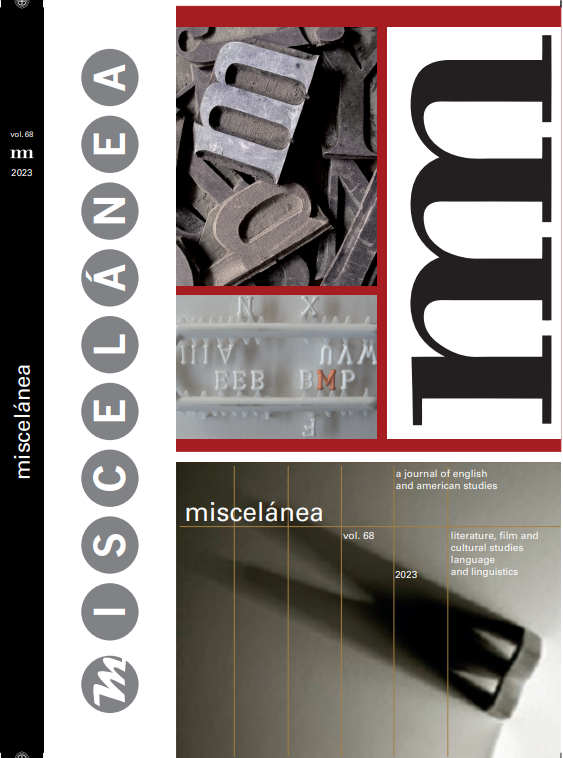Evaluación formativa del desempeño en el proceso de desarrollo de subcompetencias de traducción
DOI:
https://doi.org/10.26754/ojs_misc/mj.20238758Palabras clave:
subcompetencias de traducción, enseñanza de la traducción, evaluación formativa del desempeño para el aprendizaje, enfoque comunicativo del aprendizaje, enseñanza en líneaResumen
Este trabajo de investigación se refiere al método de evaluación del desempeño del estudiante aplicado al proceso de aprendizaje colaborativo en línea. El modelo de evaluación está destinado al desarrollo de subcompetencias de traducción. El modelo implica el análisis del discurso de los miembros del equipo en el proceso de negociación de significados en cumplimiento de la afirmación de Gery Stahl de que el discurso constituye interpretación (2004: 22). El formulario de evaluación individual ideado abarca el estudio del desempeño de los miembros del equipo colaborador en dos espacios dialógicos, el espacio de contenido y el espacio relacional de colaboración (Janssen and Bodemer 2013). El procedimiento de evaluación comprende el análisis de los logros individuales de los estudiantes, así como su contribución a la construcción del conocimiento experto del equipo. El objetivo principal de este trabajo de investigación es resaltar la función reguladora del método formativo de evaluación del desempeño para el aprendizaje en equipo e indicar las interdependencias entre el aprendizaje colaborativo, la evaluación formativa del desempeño y el enfoque comunicativo del aprendizaje, este último constituye el marco teórico para esta investigación.
Descargas
Citas
ARVAJA, Maarit. 2007. “Contextual Perspective in Analysing Collaborative Knowledge Construction of Two Small Groups in Web-based Discussion”. International Journal of Computer-Supported Collaborative Learning 2: 133-158. <https://doi.org/10.1007/s11412-007-9013-5>.
BLOOM, Benjamin S., John Thomas HASTINGS, George F. MADAUS. 1971. Handbook on Formative and Summative Evaluation of Student Learning. New York: McGraw-Hill.
BOJANOWICZ, Justyna. 2019. “Ocenianie kształtujące w kształceniu akademickim”. Edukacja – Technika – Informatyka 4 (30): 122-127. <https://doi.org/10.15584/eti.2019.4.16>.
BRUFFEE, Kenneth A. 1999. Collaborative Learning. Higher Education, Interdependence, and the Authority of Knowledge. Baltimore: Johns Hopkins U.P.: 1-19.
GAJEWSKA, Elżbieta and Agnieszka M. SENDUR. 2015. “Ocenianie w nauczaniu języków obcych zorientowanym na cele ogólne a ocenianie w nauczaniu zorientowanym na cele zawodowe”. Języki Obce 3: 49-53.
GODLEWSKA, Małgorzata. 2023. “Building Translation Sub-Competences of Foreign Language Students in Telecollaboration”. In Lankiewicz, Hadrian A. (ed.) Extending Research Horizons in Applied Linguistics: Between Interdisciplinarity and Methodological Diversity. United Kingdom: Equinox: 10-51.
GRUCZA, Franciszek. (1979) 2017. “Nauczanie języków obcych a tłumaczenie”. In Grucza, Sambor, Magdalena Olpińska-Szkiełko, Magdalena Płużyczka, Ilona Banasiak and Marcin Łączka (eds.) Franciszek Grucza. Dzieła zebrane. Tom5. O uczeniu języków obcych i glottodydaktyce I. Warszawa: Uniwersytet Warszawski: 55-69.
HÄMÄLÄINEN, Raija. 2012. “Methodological Reflections: Designing and Understanding Computer-Supported Collaborative Learning”. Teaching in Higher Education 17 (5): 603-614. <https://doi.org/10.1080/13562517.2012.658556>.
HÄMÄLÄINEN, Raija and Maarit ARVAJA. 2009. “Scripted Collaboration and Group-Based Variations in a Higher Education CSCL Context”. Scandinavian Journal of Education Research 53 (1): 1-16. <http://doi.org./10.1080/00313830802628281>.
HURTADO ALBIR, Amparo. 2017. Researching Translation Competence by PACTE Group. Amsterdam, Philadelphia: John Benjamins Publishing Company.
JANICKA, Monika. 2019. “Rozwijanie kompetencji kluczowych jako jeden z celów nauki języków obcych”. JOwS 5. <https://issuu.com/frse/docs/jows-5-2019-online/s/15143954>. Accessed September 17, 2023.
JANSSEN, Jeroen and Daniel BODEMER. 2013. “Coordinated Computer-Supported Collaborative Learning: Awareness and Awareness Tools”. Educational Psychologist 48 (1): 40-55. <https://doi.org/10.1080/00461520.2012.749153>.
JANSSEN, Jeroen and Paul A. KIRSCHNER. 2020. “Applying Collaborative Cognitive Load Theory to Computer-Supported Collaborative Learning: Towards a Research Agenda”. Educational Technology Research and Development 68 (2): 783-805.<https://doi.org/10.1007/s11423-019-09729-5>.
JOHNSON, David W., Roger T. JOHNSON and Karl A. SMITH. 2013. “The State of Cooperative Learning in Postsecondary and Professional Settings”. Educational Psychology Review 19: 15-29. <https://doi.org/10.1007/s10648-006-9038-8>.
KOMOROWSKA, Hanna. 2007. Sprawdzanie umiejętności w nauce języka obcego. Kontrola – ocena – testowanie. Warszawa: Wydawnictwo Edukacyjne Fraszka.
KOMOROWSKA, Hanna. 2019. “Ocenianie w nauczaniu języków obcych. Fakty, mity i trudności”. Neofilolog 53 (2): 153-170.
LINELL, Per. 1998. Approaching Dialogue. Talk, Interaction, and Contexts in Dialogical Perspectives. Amsterdam: John Benjamins Publishing.
MASON, Edwin. 1972. Collaborative Learning. New York: Agathon Press.
MATTHEWS, Roberta S., James L. COOPER, Neil DAVIDSON, Peter HAWKINS. 1995. “Building Bridges between Cooperative and Collaborative Learning”. Change 27 (4): 35-40. <https://doi.org/10.1080/00091383.1995.9936435>.
MURPHEY, Tim and George M. JACOBS. 2000. “Encouraging Critical Collaborative Autonomy”. JALT Journal 22: 220-244. <https://doi.org/10.37546/JALTJJ22.2-1>.
MYSKOW, Gordon, Philip A. BENNETT, Hisako YOSHIMURA, Kyoko GRUENDEL, Takuto MARUTANI, Kaori HANO and Teressa LI. 2018. “Fostering Collaborative Autonomy: The Roles of Cooperative and Collaborative Learning”. Relay Journal 1 (2): 360-381. <https://doi.org/10.37237/relay/010212>.
NORD, Christiane. 1994. “It’s Tea-Time in Wonderland. Culture-Markers in Fictional Texts”. In Purshel, Heiner (ed.) International Communication. Frankfurt: Peter Lang: 523-538.
PACTE. 2003. “Building a Translation Competence Model”. In Alves, Fabio dos Santos (ed.) Triangulating Translation: Perspectives in Process Oriented Research, Amsterdam: John Benjamins Publishing: 43-66.
PAWLAK, Mirosław. 2021. “Ocenianie umiejętności językowych: dlaczego nie robić tego nieco inaczej?” JOwS 3: 5-12.
ROSELLI, D. Nestor. 2016. “El aprendizaje colaborativo: Bases teóricas y estrategias aplicables en la enseñanza universitaria”. Propósitos y Representaciones 4 (1): 219-280. <https://doi.org/10.20511/pyr2016.v4n1.90>.
SCRIVEN, Michael. 1966. The Methodology of Evaluation. Lafayette, Ind.: Purdue U.P.
SMITH, Zadie. 2013. “Joy”. The New York Review of Books (January 10). <https://www.nybooks.com/articles/2013/01/10/joy/>. Accessed March 23, 2023.
STAHL, Gerry. 2004. “Building Collaborative Knowing. Elements of a Social Theory of CSCL”. In Kirschner, Paul Arthur, Rob Martens and Jan-Willem Strijbos (eds.) Computer-Supported Collaborative Learning, Vol. 3. What We Know about CSCL and Implementing it in Higher Education. Boston MA: Kluwer Academic Publishers: 53-85.
STERNA, Danuta. 2016. Uczę się uczyć. Ocenianie kształtujące w praktyce. Warszawa: Centrum Edukacji Obywatelskiej.
VAN DEN BROECK, Raymond. 1981. “The Limits of Translatability Exemplified by Metaphor Translation”. Poetics Today 2 (4): 73-87. <https://www.jstor.org/stable/1772487>.
Descargas
Publicado
Cómo citar
Número
Sección
Licencia
Derechos de autor 2023 Malgorzata Godlewska

Esta obra está bajo una licencia internacional Creative Commons Atribución-NoComercial 4.0.
Aceptado 2023-05-02
Publicado 2023-12-19


